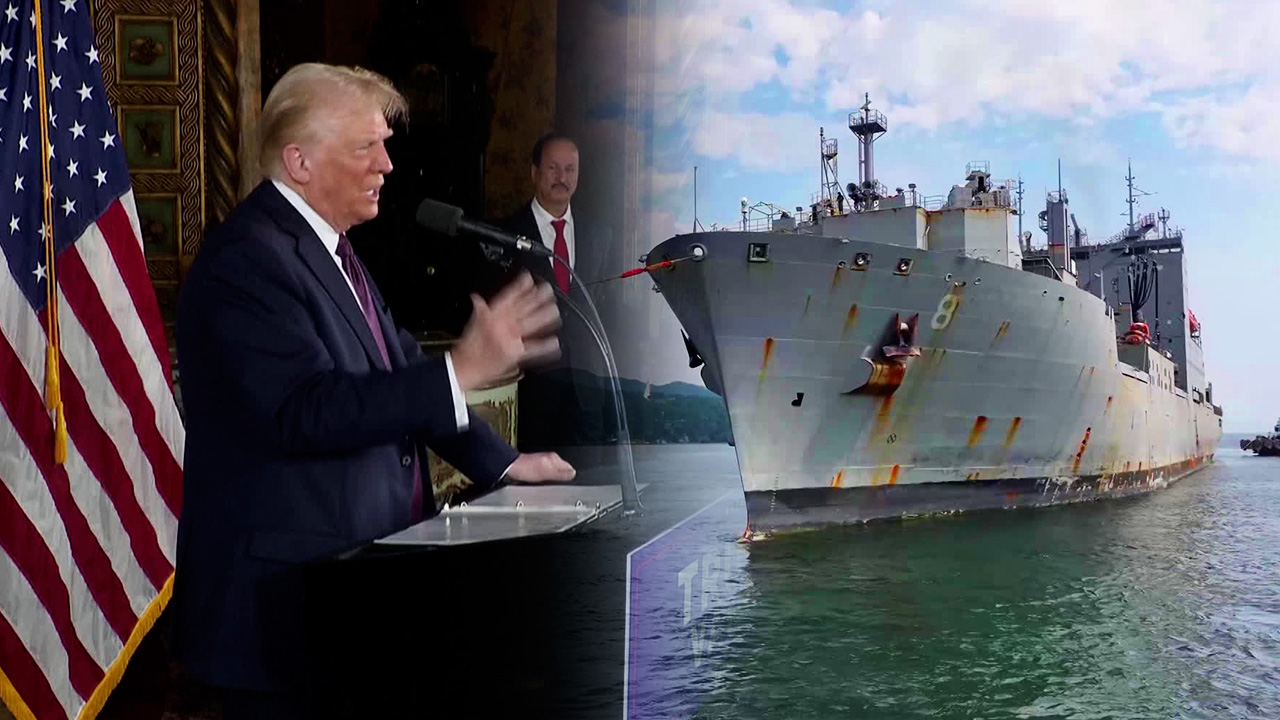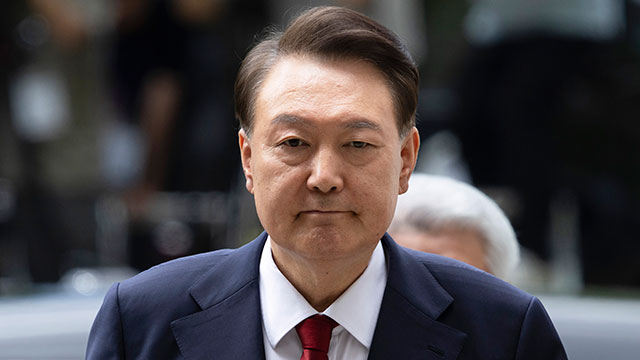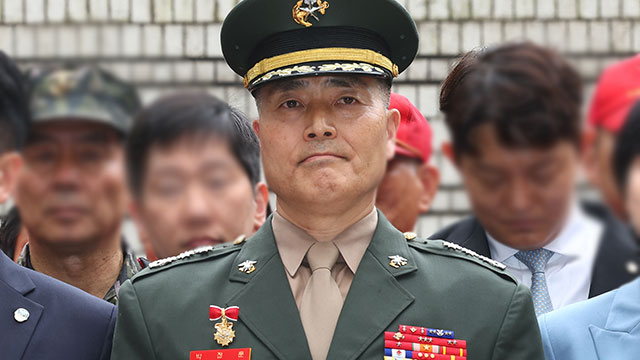[Anchor]
As we have reported, the second Trump term will begin in just two days.
Despite a flood of promises that have increased concerns for Korean companies, including tariffs, trade barriers, and subsidy cuts, there are industries that expect to benefit.
One of them is the shipbuilding sector.
Reporter Lee Do-yoon has examined the expectations and outlook.
[Report]
The industry that President-elect Trump has uncommonly reached out to overseas is shipbuilding.
[Donald Trump/President-elect/Hugh Hewitt Show/Jan. 6: "Maybe we'll use allies also. China is building, from what I'm hearing, every four days they're knocking out a ship."]
In particular, he has sought assistance from South Korea for the maintenance, repair, and servicing of naval vessels.
Due to a lack of shipyards and production facilities, the number of U.S. naval vessels is nearly 40 behind China.
Our shipbuilding industry has quickly responded by obtaining qualifications for U.S. naval vessel maintenance and securing contracts for the maintenance of U.S. Navy support ships and refueling ships.
According to U.S. law, foreign shipyards cannot handle combat vessels and can only perform maintenance on support vessels.
Even this level of cooperation is expected to open a market worth 350 billion won, according to industry assessments.
There are also expectations that the scale of cooperation will increase in the future.
[Kim Dae-sik/Head of Special Ship MRO Business Team, Hanwha Ocean: "We expect that through future changes in U.S. regulations or laws, the scope of contracts will expand to include combat vessels."]
What about the commercial ship market?
Here, work is underway to build LNG carriers.
There are many expectations that the Trump administration will also benefit from orders for such commercial vessels.
President-elect Trump's plan is to increase the development of fossil fuels such as oil and natural gas, which will also increase the demand for transport vessels to carry and export these resources.
[Jung Sung-ho/Executive Director, HD Hyundai Samho: "(After recent constructions) the number of (commercial) vessels that can be built simultaneously has increased from 14 to 18."]
There are also calls to overcome the export wave that could hit other sectors based on shipbuilding cooperation.
[Jang Sang-sik/Director, International Trade Research Institute, Korea International Trade Association: "Korea is a key country needed to build a supply chain that replaces China for the U.S. We need to build mutual trust through technology exchange."]
The government has also announced that it will actively support the establishment of a cross-ministerial support team for Korea-U.S. shipbuilding cooperation.
This is KBS News, Lee Do-yoon.
As we have reported, the second Trump term will begin in just two days.
Despite a flood of promises that have increased concerns for Korean companies, including tariffs, trade barriers, and subsidy cuts, there are industries that expect to benefit.
One of them is the shipbuilding sector.
Reporter Lee Do-yoon has examined the expectations and outlook.
[Report]
The industry that President-elect Trump has uncommonly reached out to overseas is shipbuilding.
[Donald Trump/President-elect/Hugh Hewitt Show/Jan. 6: "Maybe we'll use allies also. China is building, from what I'm hearing, every four days they're knocking out a ship."]
In particular, he has sought assistance from South Korea for the maintenance, repair, and servicing of naval vessels.
Due to a lack of shipyards and production facilities, the number of U.S. naval vessels is nearly 40 behind China.
Our shipbuilding industry has quickly responded by obtaining qualifications for U.S. naval vessel maintenance and securing contracts for the maintenance of U.S. Navy support ships and refueling ships.
According to U.S. law, foreign shipyards cannot handle combat vessels and can only perform maintenance on support vessels.
Even this level of cooperation is expected to open a market worth 350 billion won, according to industry assessments.
There are also expectations that the scale of cooperation will increase in the future.
[Kim Dae-sik/Head of Special Ship MRO Business Team, Hanwha Ocean: "We expect that through future changes in U.S. regulations or laws, the scope of contracts will expand to include combat vessels."]
What about the commercial ship market?
Here, work is underway to build LNG carriers.
There are many expectations that the Trump administration will also benefit from orders for such commercial vessels.
President-elect Trump's plan is to increase the development of fossil fuels such as oil and natural gas, which will also increase the demand for transport vessels to carry and export these resources.
[Jung Sung-ho/Executive Director, HD Hyundai Samho: "(After recent constructions) the number of (commercial) vessels that can be built simultaneously has increased from 14 to 18."]
There are also calls to overcome the export wave that could hit other sectors based on shipbuilding cooperation.
[Jang Sang-sik/Director, International Trade Research Institute, Korea International Trade Association: "Korea is a key country needed to build a supply chain that replaces China for the U.S. We need to build mutual trust through technology exchange."]
The government has also announced that it will actively support the establishment of a cross-ministerial support team for Korea-U.S. shipbuilding cooperation.
This is KBS News, Lee Do-yoon.
■ 제보하기
▷ 카카오톡 : 'KBS제보' 검색, 채널 추가
▷ 전화 : 02-781-1234, 4444
▷ 이메일 : kbs1234@kbs.co.kr
▷ 유튜브, 네이버, 카카오에서도 KBS뉴스를 구독해주세요!
- Koream shipbuilding to help U.S.
-
- 입력 2025-01-18 23:54:13

[Anchor]
As we have reported, the second Trump term will begin in just two days.
Despite a flood of promises that have increased concerns for Korean companies, including tariffs, trade barriers, and subsidy cuts, there are industries that expect to benefit.
One of them is the shipbuilding sector.
Reporter Lee Do-yoon has examined the expectations and outlook.
[Report]
The industry that President-elect Trump has uncommonly reached out to overseas is shipbuilding.
[Donald Trump/President-elect/Hugh Hewitt Show/Jan. 6: "Maybe we'll use allies also. China is building, from what I'm hearing, every four days they're knocking out a ship."]
In particular, he has sought assistance from South Korea for the maintenance, repair, and servicing of naval vessels.
Due to a lack of shipyards and production facilities, the number of U.S. naval vessels is nearly 40 behind China.
Our shipbuilding industry has quickly responded by obtaining qualifications for U.S. naval vessel maintenance and securing contracts for the maintenance of U.S. Navy support ships and refueling ships.
According to U.S. law, foreign shipyards cannot handle combat vessels and can only perform maintenance on support vessels.
Even this level of cooperation is expected to open a market worth 350 billion won, according to industry assessments.
There are also expectations that the scale of cooperation will increase in the future.
[Kim Dae-sik/Head of Special Ship MRO Business Team, Hanwha Ocean: "We expect that through future changes in U.S. regulations or laws, the scope of contracts will expand to include combat vessels."]
What about the commercial ship market?
Here, work is underway to build LNG carriers.
There are many expectations that the Trump administration will also benefit from orders for such commercial vessels.
President-elect Trump's plan is to increase the development of fossil fuels such as oil and natural gas, which will also increase the demand for transport vessels to carry and export these resources.
[Jung Sung-ho/Executive Director, HD Hyundai Samho: "(After recent constructions) the number of (commercial) vessels that can be built simultaneously has increased from 14 to 18."]
There are also calls to overcome the export wave that could hit other sectors based on shipbuilding cooperation.
[Jang Sang-sik/Director, International Trade Research Institute, Korea International Trade Association: "Korea is a key country needed to build a supply chain that replaces China for the U.S. We need to build mutual trust through technology exchange."]
The government has also announced that it will actively support the establishment of a cross-ministerial support team for Korea-U.S. shipbuilding cooperation.
This is KBS News, Lee Do-yoon.
As we have reported, the second Trump term will begin in just two days.
Despite a flood of promises that have increased concerns for Korean companies, including tariffs, trade barriers, and subsidy cuts, there are industries that expect to benefit.
One of them is the shipbuilding sector.
Reporter Lee Do-yoon has examined the expectations and outlook.
[Report]
The industry that President-elect Trump has uncommonly reached out to overseas is shipbuilding.
[Donald Trump/President-elect/Hugh Hewitt Show/Jan. 6: "Maybe we'll use allies also. China is building, from what I'm hearing, every four days they're knocking out a ship."]
In particular, he has sought assistance from South Korea for the maintenance, repair, and servicing of naval vessels.
Due to a lack of shipyards and production facilities, the number of U.S. naval vessels is nearly 40 behind China.
Our shipbuilding industry has quickly responded by obtaining qualifications for U.S. naval vessel maintenance and securing contracts for the maintenance of U.S. Navy support ships and refueling ships.
According to U.S. law, foreign shipyards cannot handle combat vessels and can only perform maintenance on support vessels.
Even this level of cooperation is expected to open a market worth 350 billion won, according to industry assessments.
There are also expectations that the scale of cooperation will increase in the future.
[Kim Dae-sik/Head of Special Ship MRO Business Team, Hanwha Ocean: "We expect that through future changes in U.S. regulations or laws, the scope of contracts will expand to include combat vessels."]
What about the commercial ship market?
Here, work is underway to build LNG carriers.
There are many expectations that the Trump administration will also benefit from orders for such commercial vessels.
President-elect Trump's plan is to increase the development of fossil fuels such as oil and natural gas, which will also increase the demand for transport vessels to carry and export these resources.
[Jung Sung-ho/Executive Director, HD Hyundai Samho: "(After recent constructions) the number of (commercial) vessels that can be built simultaneously has increased from 14 to 18."]
There are also calls to overcome the export wave that could hit other sectors based on shipbuilding cooperation.
[Jang Sang-sik/Director, International Trade Research Institute, Korea International Trade Association: "Korea is a key country needed to build a supply chain that replaces China for the U.S. We need to build mutual trust through technology exchange."]
The government has also announced that it will actively support the establishment of a cross-ministerial support team for Korea-U.S. shipbuilding cooperation.
This is KBS News, Lee Do-yoon.
-
-

이도윤 기자 dobby@kbs.co.kr
이도윤 기자의 기사 모음
-
이 기사가 좋으셨다면
-
좋아요
0
-
응원해요
0
-
후속 원해요
0











![[속보] 내란특검, 조태용 전 국정원장 주거지 등 8곳 압수수색](/data/news/2025/07/16/20250716_amIepj.jpg)



이 기사에 대한 의견을 남겨주세요.